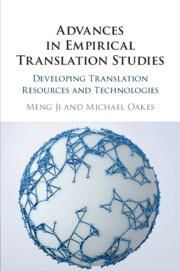Book contents
- Advances in Empirical Translation Studies
- Advances in Empirical Translation Studies
- Copyright page
- Contents
- Figures
- Tables
- Contributors
- Preface
- 1 Advances in Empirical Translation Studies
- 2 Development of Empirical Multilingual Analytical Instruments
- 3 Statistics for Corpus-Based and Corpus-Driven Approaches to Empirical Translation Studies
- 4 The Evolving Treatment of Semantics in Machine Translation
- 5 Translating and Disseminating World Health Organization Drinking-Water-Quality Guidelines in Japan
- 6 Developing Multilingual Automatic Semantic Annotation Systems
- 7 Leveraging Large Corpora for Translation Using Sketch Engine
- 8 Developing Computerised Health Translation Readability Evaluation Tools
- 9 Reordering Techniques in Japanese and English Machine Translation
- 10 Audiovisual Translation in Mercurial Mediascapes
- 11 Exploiting Data-Driven Hybrid Approaches to Translation in the EXPERT Project
- 12 Advances in Speech-to-Speech Translation Technologies
- 13 Challenges and Opportunities of Empirical Translation Studies
- Index
- References
7 - Leveraging Large Corpora for Translation Using Sketch Engine
Published online by Cambridge University Press: 10 June 2019
- Advances in Empirical Translation Studies
- Advances in Empirical Translation Studies
- Copyright page
- Contents
- Figures
- Tables
- Contributors
- Preface
- 1 Advances in Empirical Translation Studies
- 2 Development of Empirical Multilingual Analytical Instruments
- 3 Statistics for Corpus-Based and Corpus-Driven Approaches to Empirical Translation Studies
- 4 The Evolving Treatment of Semantics in Machine Translation
- 5 Translating and Disseminating World Health Organization Drinking-Water-Quality Guidelines in Japan
- 6 Developing Multilingual Automatic Semantic Annotation Systems
- 7 Leveraging Large Corpora for Translation Using Sketch Engine
- 8 Developing Computerised Health Translation Readability Evaluation Tools
- 9 Reordering Techniques in Japanese and English Machine Translation
- 10 Audiovisual Translation in Mercurial Mediascapes
- 11 Exploiting Data-Driven Hybrid Approaches to Translation in the EXPERT Project
- 12 Advances in Speech-to-Speech Translation Technologies
- 13 Challenges and Opportunities of Empirical Translation Studies
- Index
- References
Summary
Translation is a demanding, competitive, and labour-intensive activity that requires more than just advanced language skills. If translators are to thrive in such a cutting-edge working environment, they need to possess good computer literacy skills and be well-versed in the art of strategic information mining - in other words, they need to know how to make best use of the plethora of dictionaries, glossaries, books, websites, and other online resources at their disposal in order to find the required information in the shortest amount of time possible. This includes finding translation equivalents and domain-specific terms, checking collocations, idioms, and phrasal verbs, and exploring the way words are used in context by native speakers in order to render the text grammatically, semantically, and stylistically appropriate. Corpora, i.e. large electronic collections of computer-processed, linguistically annotated texts, can serve as an invaluable source of linguistic information, providing the translator with a sample of genuine texts in the target language and, in some cases, translations of similar texts. Over the past two decades, a wide variety of monolingual, comparable, and parallel corpora have been compiled, and these can be searched using either downloadable or online corpus query systems (CQS) such as the Sketch Engine. Whilst computer-assisted translation (CAT) tools such as SDL Trados and MemoQ are a staple of the translation process, translators are still relatively conservative when it comes to using corpora and CQSs to inform their practice. This chapter will introduce the Sketch Engine as a powerful suite of corpus tools for translation and cross-linguistic analysis. Centred around a case study featuring a real-life translation scenario, it will discuss various features of the software which can be used to leverage very large web-based monolingual and parallel corpora for translation, i.e. the concordancer, the word sketches tool, the thesaurus, the term extraction feature, and the corpus building tool.
- Type
- Chapter
- Information
- Advances in Empirical Translation StudiesDeveloping Translation Resources and Technologies, pp. 110 - 144Publisher: Cambridge University PressPrint publication year: 2019
References
- 2
- Cited by

